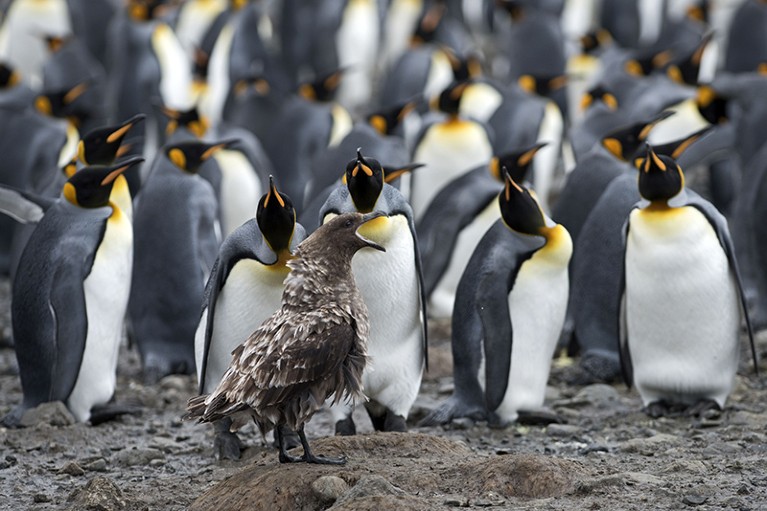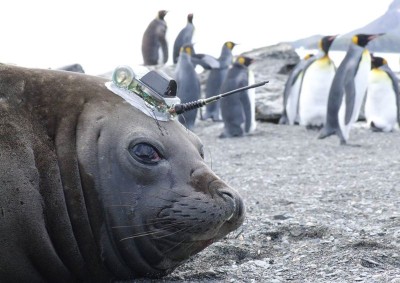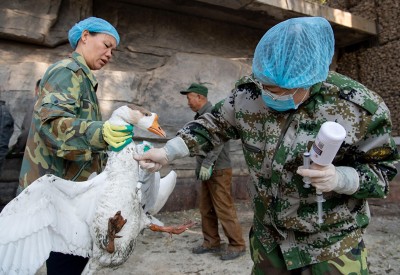
Avian flu has been detected sub-Antarctic king penguins.Credit: Education Images/Universal Images Group via Getty
A deadly strain of bird flu circulating worldwide is disrupting research in Antarctica and could lead to the cancellation of some projects to study penguins, seals and other animals next year.
“This is the first time I remember such reduced access to animal colonies since I started my Antarctic career in 1996,” says microbiologist Antonio Quesada del Corral, who manages the Spanish Antarctic research programme and is based in Madrid.
“Several projects were cancelled this year, because we wanted to reduce the risk of having an infection of people or being the vector that spreads sickness between different animal colonies,” he says. “We had scheduled for next year more new projects on animal colonies — some of these are now likely not going to take place.”

Antarctic seals recruited to measure effects of climate change
Researchers first detected avian influenza, caused by the circulating H5N1 subtype of the virus, in the wider Antarctic region in October 2023. They found the virus in dead birds, including skuas and gulls, in the sub-Antarctic territory of South Georgia and the South Sandwich Islands.
This sparked fears among scientists that bird flu would soon reach Antarctica itself. “We were very afraid,” says Quesada del Corral. As a result, he says, the Spanish Antarctic research programme was revised for the summer season, which runs from around October to late March. Since then, only researchers specializing in infectious diseases and viruses have been allowed access to animal colonies, he adds. In the sub-Antarctic, the virus is known to have spread to elephant and fur seals, albatrosses, terns, gentoo penguins and king penguins, suggesting that these animals are also at risk in Antarctica.
Data disruption
Table of Contents
Researchers involved in about half a dozen projects have been unable to collect data from sensors that are located in animal colonies and gather information year-round, says Quesada del Corral. “We had several projects that needed to download information from some sensors [located] in colonies of penguins, sea lions, elephant seals, leopard seals — and they were not able to go in there.”
Some of these long-term projects aim to monitor animal behaviour — for example, to determine when penguins hatch, moult and move to or from a rookery. Others aim to track the impacts of the animals on the environment, or to sample bacteria in aerosols produced by the colonies.

How to stop the bird flu outbreak becoming a pandemic
In theory, data collected by sensors could still be retrievable next year. “The memory of the sensors is normally about two years,” says Quesada del Corral. “We usually change the battery every year. Hopefully next year they will have at least partial data collected.”
But there is a chance that the batteries will fail, or that restrictions could tighten. “I really am afraid that next year the season is going to be worse than this,” he adds.
The activities of Argentine researchers have also been disrupted by bird flu, says Martín Ansaldo, an ecologist at the Argentine Antarctic Institute in Buenos Aires. “We suspended all activities that had direct contact with animals, wherever we observed animals with unusual behaviour or an unusual increase in the number of dead,” he says. This affected scientists studying the reproduction, behaviour and physiology of birds and mammals.
Research carried out under the US Antarctic Program has not yet been disrupted by bird flu, according to the National Science Foundation (NSF), which funds the programme. Nonetheless, “it is possible that any future outbreak detected could impact research”, an NSF spokesperson told Nature. “Decisions will be made on a case-by-case basis.”
Tip of the iceberg
Researchers’ fears were confirmed in February, when H5N1 was detected on the Antarctic mainland for the first time. The virus was found in dead skuas near Argentina’s Primavera research station, located on the Antarctic Peninsula, which stretches north towards South America. “With this confirmation, we know that the infection can reach any colony in a few days,” says Quesada del Corral.
Scientists have just started a new expedition to sample for bird flu on the Antarctic Peninsula, says Antonio Alcamí, a virologist based at the Severo Ochoa Centre for Molecular Biology in Madrid, who was among those who first detected H5N1 on the mainland.
Monitoring the spread of the virus will help to protect researchers on Antarctica. “The confirmation of H5N1 [on the mainland] generated an early warning to take extreme care of the people working in Antarctica, both logistical and scientific,” says Ansaldo. “We must be prepared to protect both the Antarctic fauna and the human beings working there.”
